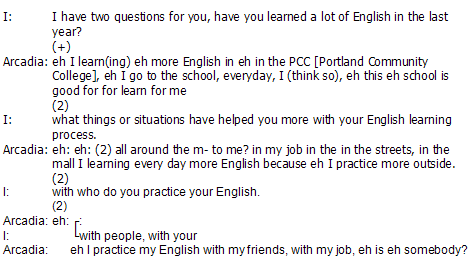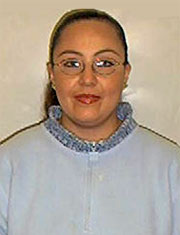As with many of the participants in the Learner Portraits project, Arcadia considered her job in the U.S. to be of much lower status than the job she had in Mexico. Arcadia worked for 14 years as an Executive Secretary in Mexico before coming to the U.S. Here, she has been working since 2003 as a custodian at two local department stores. She worked part-time in 2003 and 2004 switching to full-time in 2005.
Achieving a higher status and better paying job seemed to be a strong motivation for Arcadia's taking ESL classes. A catch-22 for immigrant-learners in Arcadia's situation, however, is the fact that when they take on a new, better job, they need to cut back on ESL classes which may prevent them from achieving even more meaningful work positions.
From an interview in 2004 (in English), Arcadia reports that settings outside the classroom (including work) have been beneficial for her English language proficiency.
 | ||
| Hide Conversation | ||
Two years later, Arcadia also reports in this excerpt from an interview (in Spanish) that her workplace is a place where she can use and improve her English language skills.
| Arcadia: | Oh, yes I am working for [large Portland area department store], cleaning the store. And before that I used to clean at [large Portland mall]. | |
| I: | Ahh. Okay. Do you use English more? | |
| Arcadia: | Oh yes, a lot more. And the clients of the store are all Americans. Also, my supervisor only speaks English. Many times I have to answer calls in the store, if I have to say something to the cashier or to the customers who make requests I have to make an extra effort to speak in English. | |
| I: | So people ask you questions in English? | |
| Arcadia: | Yes, many customers ask me in English if for example they can use the bathroom. In general people ask me in English and I have to help them also in English. | |
| I: | so you are using your English more? | |
| Arcadia: | yes. | |
| Hide Conversation | ||
While the previous two excerpts show possible advantages to work as a site for English language use and learning, Arcadia reports quite a negative characterization of the shift in work status for her as well as many immigrants to the U.S. The following excerpt also comes from the 2006 Spanish language interview.
| I: | Do you have any other U.S. experiences that you want to share? | |
| Arcadia: | Well that I think my experience is like every one else's - come to this country and work and see that things are not the way we want. It is very hard to work in a place…in a place that was unthinkable for me. | |
| I: | But how do you feel now? | |
| Arcadia: | Now I feel better. I want to work in something different, a job that is not related to or viewed as Hispanic work. I want something different. | |
| Hide Conversation | ||
This characterization by Arcadia of ‘Hispanic work' is partly the result of her experiences with customers at her workplace. In the context of responding to how her family in Mexico sees the U.S. and Arcadia's life in the U.S., Arcadia describes the feeling of being treated as an outsider and discrimination.
| I: | so what do they [your family] think? | |
| Arcadia: | They think that this is a wonderland, it is cool to live here, to live in an apartment building with a washer and dryer and swimming pool. And everybody says, "you live wonderful" but they don't know all the things that we suffer and all the discrimination that we face. | |
| I: | Have you felt discriminated? | |
| Arcadia: | No, but in my work I realized that people discriminate against you for being Hispanic. There are people who do not respect us. There are people who thank you for your work and there are people who do not care that you are Hispanic. They think you are part of their country but there are people that do not like you. | |
| I: | How did they treat you? | |
| Arcadia: | Yes, there are people that see you are working in an area and just walk over you and they don't say sorry or anything. And there are people who talk to you in English, even though they are aware that you do no understand, and force you to speak in English, so sometimes I feel discriminated in that aspect. | |
| I: | Do you feel discriminated against at work? | |
| Arcadia: | No, the rude people are the people who go to the store and discriminate and do not respect you and don't want you. No neither my supervisor, nor my coworkers [are discriminatory]. And you know in the workplace, it is more difficult for someone to discriminate against you due to the possibility of a lawsuit. But when people go to the store, they are impolite with us. | |
| Hide Conversation | ||
So for Arcadia, while the workplace offers some opportunities for using and improving her English language skills, there are tensions associated with the workplace. While there may be benefits for learners to be interacting in the English-dominant society through work, this is not the case in all situations. Arcadia reports that her work is perceived as low status and her reports of discrimination or lack of respect give support to that feeling. What is more, as we see in her standardized language assessments, it appears that her switch to full-time work (and end of ESL classes) corresponds to a marked decrease in English language reading and a decline in other areas of English language proficiency.
